2017_hats_off.jpg
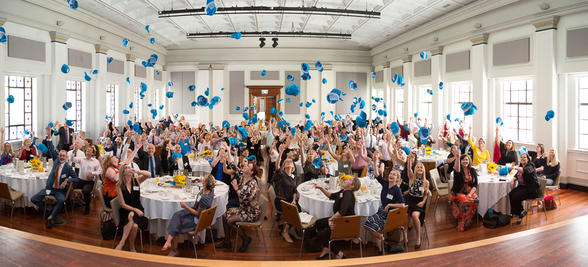
Queensland Mental Health Week 2017 Achievement Awards
Commissioner’s viewpoint
State sets pace for Mental Health Week
Sincere thanks to everyone who participated in, and supported Queensland Mental Health Week 2017.
Your efforts are incredible—not just for the number of community events (237 at final count), but for the spread across every corner of the state; and most of all, for your passion and commitment to putting mental health and wellbeing in the spotlight.
It’s great to see corporate sector involvement in the week. One corporate event, hosted by the Windsor Group, a long-term supporter of Queensland Mental Health Week, highlighted the example of Lend Lease. Lend Lease has invested in a staff wellbeing program that is self-funding through company shares, demonstrating innovative thinking in corporate social responsibility.
There are many individuals, groups and organisations that make Queensland’s Mental Health Week one of the largest in the country. I’d particularly like to acknowledge:
- Mental Awareness Foundation whose walk raises vital funds for mental health initiatives and organisations
- Open Minds for coordinating the Achievement Awards
- Brisbane South PHN for the Brisbane Mental Health Expo, which included support from Brisbane North PHN and Metro North and Metro South HHS’s and some sixty other organisations
- Queensland Alliance for Mental Health for administering the QMHW Community Event Grants.
Congratulations also to the nominees and winners of the Achievement Awards—your example is a beacon to all of us who are striving for a better tomorrow.
- Watch the Commissioner’s QMHW video message.
Your voice heard
Queensland Mental Health Week was the perfect platform to start the conversation about where mental health, alcohol and other drug, and suicide prevention reforms are headed.
We released the Your voice, one vision: Consultation report 2017, which lays out what you said to us earlier this year during consultations for a renewed strategic plan.
The report reveals the system issues that need to be addressed, highlights progress and areas of good performance, and outlines opportunities for system reform.
The Minister for Health, Cameron Dick spoke at the launch, which was attended by leaders in mental health, government and community sectors, and people who took part in the consultation process.
Thank you to everyone who gave their views—particularly those with a lived experience—your wisdom and experience will help shape the next phase of reforms. We’re now commencing work to develop a new Strategic Plan, to be published in 2018.
Carers Week
Don’t forget this week is Carers Week (15-21 October), and time to acknowledge the considerable contribution carers make, whether they are family, friends or other support people.
Not only do carers provide essential day-to-day support to people with a lived experience, they are essential to recovery, and a vital link in the mental health, alcohol and other drug system for treatment teams.
I was honoured to speak at the Carers Week 2017 Mental Health Forum, hosted by Arafmi Queensland and AfterCare this week. Now in its third year, I’ve seen many of the same people each year: the commitment, dedication and engagement of those present is an inspiration.
- Get involved with Carers Week 2017 and say thank you.
- For carer support, information and resources, visit the Australian Government’s Carer Gateway.
National service
With the terms of Queensland’s representatives on the National Mental Health Consumer and Carer Forum expiring in February 2018, the Commission is leading the recruitment and selection for the positions.
Expressions of interest close Friday 17 November 2017.
Changing places
Finally, I’d like to thank Carmel Ybarlucea for her valuable contribution to the Commission. Carmel has taken the opportunity of a senior position in the Department of Education, and can be justifiably proud of her work in advancing the mental health agenda in Queensland.
I’d like to introduce you to, and welcome Jessica Martin, who is taking up the role of Acting Executive Director, Strategy Policy and Research. Jess comes to the Commission from the Department of Premier and Cabinet and has considerable experience working across government and mental health.
Ivan Frkovic
Queensland Mental Health Commissioner
Connect on Linkedin
Renewing the strategic plan
Your voice, one vision
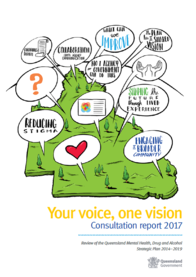
On World Mental Health Day (10 October) we launched the consultation report Your voice, one vision at Parliament House.
The report draws together the wealth of information and experience shared with us during consultation to renew the Queensland Mental Health, Drug and Alcohol Strategic Plan and sets the scene for future reform in Queensland.
Of the many findings, was a consistent message of ‘people first, not the system’, expressed as a desire that the system be designed from the perspective of those people using the system.
- Read more in our media release Mental health reforms need to focus on people.
- Watch Commissioner Ivan Frkovic’s video message.
Grants announced
Supporting local action
Also announced during Mental Health Week were $630,000 in grants to 16 organisations for initiatives that reduce stigma and increase participation in local communities.
Funding is from the Commission’s Stronger Community Mental Health and Wellbeing Grant program.
This takes the Commission’s total investment in better community mental health and wellbeing since 2015 to $2.51 million, with previous grant rounds delivering positive results in communities right across the State.
Annual report
Our achievements this year
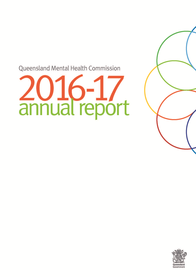
Outlined in our 2016-17 Annual Report are the key highlights from the Commission’s fourth year of operation in driving ongoing reform.
Key highlights of the year include:
- People in contact with the criminal justice system—supporting the development of a new model to bring together mental health clinicians and police to ensure better outcomes.
- Better early intervention for young people—facilitating improved collaboration between the mental health sector and the school system, with the development of a model to expand Ed-LinQ.
- Action plans in priority areas—the release of the Queensland Aboriginal and Torres Strait Islander Social and Emotional Wellbeing Action Plan 2016–18 and the Queensland Rural and Remote Mental Health and Wellbeing Action Plan 2016–18.
Read more by downloading our 2016-17 Annual Report.
Mental Health Week
Achievement Award winners
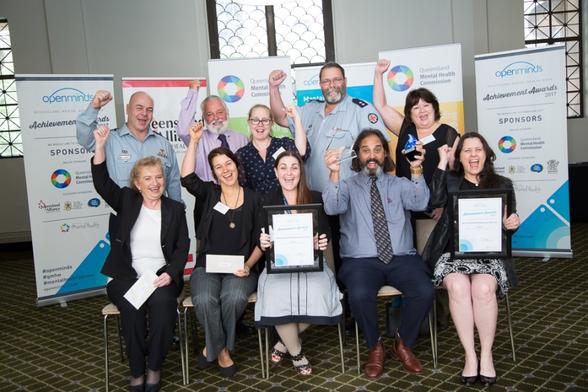
The Queensland Ambulance Service took out the Earle Duus Memorial Award
The QMHW Achievement Awards, hosted by Open Minds, are an opportunity to reflect on and celebrate the amazing people and organisations that make a difference, every day to people with a lived experience.
We salute the nominees and congratulate the winners:
Marj Bloor: Individual Award
For her contribution to the mental health sector
Leilani Darwin: Jude Bujega Peer Experience Award
For devoting her professional life to assisting other Aboriginal and Torres Strait Islander Peoples
QWeekend: Media Award
For the feature article, “When the Baby Blues Turn Black”
Access Arts: Not-for-Profit Award SME (1 to 100 staff)
As a leader in supporting vulnerable Queenslanders through art
Cooinda Mental Health Service: Not-for-Profit Award (Medium to Large 101+ staff)
For combining best-practice treatment programs and community outreach
Bremer State High School: Workplace Award SME (1 to 200 staff)
For supporting the mental health and wellbeing of students and staff
Queensland Ambulance Service: Workplace Award Large (201+ staff)
For their ‘Priority One’ Program to promote the physical, psychological and emotional wellbeing of more than 4,500 ambulance personnel and their families.
Nicole Gibson: Youth Award (25 years and under)
For being a fierce ambassador for mental health, innovation and connection
Queensland Ambulance Service: Earle Duus Memorial Award
Presented to the overall winner from the eight category winners
For more on the winners and to nominate your own mental health hero for the 2018 awards, visit Open Minds.
System reform
Creating change
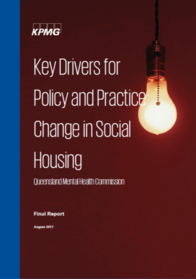
The Ordinary Report, Social Housing: Systemic issues for tenants with complex needs has been one of our most effective levers for reform, making a real difference to people’s lives.
What made this so successful? How did this achieve direct change to policy and practice? What can we learn to drive effective future reform?
As recommended by the Public Service Commission, we asked KPMG to evaluate the drivers of the Ordinary Report’s success in order to share with other agencies and inform our future agenda. Findings by KPMG identify three key drivers:
- Evidence and research
- Collaboration with shared drive and vision
- The independent role of the Commission
The findings set a positive foundation for our future work to influence policy and practice across a variety of issues and drive real, meaningful change that makes a difference to people.
Read the KPMG evaluation report.
Advisory Council
September communiqué
The fourth meeting of the Queensland Mental Health and Drug Advisory Council for 2017 was held in September, with its focus being the renewal of the Strategic Plan, the KPMG report on social housing, and future directions of the Commission. The next meeting is on 10 November 2017.
- Read the Council meeting communiqué.
- Learn more about the members of the Queensland Mental Health and Drug Advisory Council.
Lived experience
Enabling an expanded peer workforce
In 2016, we funded CQ University to examine the barriers and enablers to employing people with a lived experience in the mental health sector as peer workers. The research Chief Investigator was Dr Louise Byrne.
The research focused specifically on understanding the perspectives of senior service managers, including those in public and non-government mental health services.
The findings identified a number of key issues for supporting the peer workforce:
- Organisational culture
- Role clarity, support and supervision
- Career pathways
- Read the research report Identifying barriers to change or its summary.
- Read The Commission’s overview Barriers and enables to live experience workforce development.
Healthcare quality and patient safety
Have your say on healthcare reporting in Queensland.
Queensland Health has released a discussion paper to understand the views of the community about the collection, reporting and use of healthcare quality and patient safety information in Queensland.
Patients, clinicians, health organisations, the media and others are invited to share their views about the possible ways that healthcare quality and patient safety reporting can be expanded in Queensland.
The aim is to:
- Enhance information available to patients
- Improve transparency for healthcare professionals
- Support the efforts of the stakeholders funding, reporting on and regulating healthcare services
- Continue to drive improvements that maintain Queensland’s leading health system.
The public consultation closes at 5.00pm on Friday 27 October 2017.
Go to the Queensland Health website.
Alcohol and other drugs
National insights
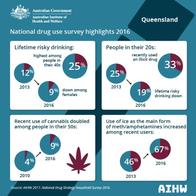
A new report gives insight into Australians’ use and attitudes towards alcohol and other drugs in 2016.
The report National Drug Household Survey 2016: detailed findings was released by the Australian Institute of Health and Welfare in September.
While not everyone who uses drugs will experience harm or become dependent, when harms do occur it can have wide ranging impacts, including on mental and physical health and wellbeing.
The survey shows about 27 per cent of people who recently used an illicit drug had been diagnosed or treated for a mental illness — an increase from 21 per cent in 2013. Rates of mental illness were particularly high for those who used meth/amphetamine and ecstasy.
Key Queensland findings
- Lifetime risky drinking is highest among people in their 40s and has decreased among women (12 per cent down to 9 per cent) and people in their 20s (25 per cent down to 19 per cent) since 2013
- 33 per cent of people in their 20s recently used an illicit drug
- Recent use of cannabis has doubled among people in their 50s since 2010 (4 per cent to 9 per cent)
- Ice as the main form of meth/amphetamines has increased among recent users (46 per cent in 2013 to 67 per cent in 2016).
Read the AIHW media release Mental illness rising among meth/amphetamine and ecstasy users.
Drug help
The Australian Government has launched a new campaign to reduce the uptake of illicit drugs.
Drug Help offers a range of information on drugs, finding help, knowing the risks, and evidence-based resources.
The campaign is part of the new National Drug Strategy 2017–2026 and aims to:
- raise awareness of the harms associated with drug use
- highlight available support and treatment services
- highlight resources for parents and guardians to empower them to talk about illegal drugs, such as ice, with their children.
Go to Drug Help.
Community
Roadmap for change
A roadmap to proactively address changes in the community services industry has been launched by the Queensland Government.
Partnering for the future: advancing Queensland’s community services industry 2017–25 was co-developed by the community services industry and the Queensland Government. It sets out priorities for action across four focus areas to ensure the industry is well positioned to meet Queensland’s current and future needs and grow its contribution to the state’s communities and economy:
- Improving outcomes for individuals, families and communities
- Growing jobs and skills
- Positioning the industry for success
- Enabling system-wide transformation.
It is accompanied by an action plan which sets the way forward for delivering on strategy priorities.
Sector news
Help developing your project idea
Queensland Treasury’s Market-Led Proposals (MLP) team is seeking approaches from businesses and the non-government sector with ideas and the ability to deliver infrastructure projects or services that meet government priorities and/or community needs.
MLPs aren’t a grant or funding program – they’re a partnership with government. Proponents bring the idea, skills, and funding, and the government provides access, approvals, support and advice.
Find out more about MLPs on the Treasury website or get in touch with the MLP Team on (07) 3035 3133.
Grants
- 2018 Queensland Women's Week Grants – One-off funding of up to $3,000 to deliver events, projects or activities during Queensland Women's Week 2018 from 3 to 11 March.
- Bundaberg Regional Council Community Grant Program – Assistance to local community groups and organisations who make positive contributions to the quality of life in the Bundaberg Region.
- Tucker Foundation grants 2018 – Grants up to $25,000 for projects that further the Foundation's aims and objectives, such as the initiation and support of social change which contributes to increasing the equal treatment and social acceptance of all persons in the community.
- Hinchinbrook Shire Council Community Activity Grants – This program aims to help support local community groups with their events and functions.
- Auswide Bank Our Community Grants Scheme – Funding available to not-for-profit organisations or local government authorities for purposes that are charitable or benevolent (in other words, for public good).
- Transurban’s Community grant program – Grants of up to $5,000 are available to support initiatives that generate social and environmental benefits for communities near Transurban’s Australian roads.
- Creativity Australia With One Voice Start Up fund – Creativity Australia is offering $10,000 grants and a 12-month intensive mentoring program to community groups, not-for-profit organisations and businesses to help them establish a With One Voice choir to help tackle loneliness and isolation.
- 2018 Domestic and Family Violence Prevention Month Community Grants – One-off funding of up to $5,000 to hold awareness raising events, projects or activities during Domestic and Family Violence Prevention Month in May 2018.
Resources
- FASD hub – A new website providing information on Fetal Alcohol Spectrum Disorders for Australian health professionals, teachers, justice professionals, service providers, researchers or parents and carers.
- Head to Health – Find the right Australian digital mental health resources on this new website launched by the Commonwealth Government.
- Drug injection trends – Drug injection trends among participants in the Australian Needle and Syringe Program Survey, 2012-2016.
- Illicit Drugs Reporting System (IDRS) and the Ecstasy and Related Drugs Reporting System (EDRS) —Designed to identify emerging trends of local and national concern in illicit drug markets, with preliminary findings just released.
Events
- Youth Voices workshop – 24 October. Join young people and adults who care about what's good for them to actively engage with the stories young people have shared. The workshop is open for 10-25 year olds and those who work with them.
- Queensland Community Recovery Forum 2017 – 25 October. The Community Recovery Forum brings together ideas from business, non-government and government to build grass roots recovery and resilience initiatives and opportunities for Queensland communities. The theme for this year is Reigniting Ideas for Resilience and Recovery.
- QCOSS State Conference – POSTPONED (see website for details). With a focus on social innovation, the conference will shine the spotlight people who have approached their business differently.
- North Brisbane Partners in Recovery Forum – 2 November. The fifth annual forum will focus on connecting mental and physical health and wellbeing. The program will include three streams of activity in the areas of: building capacity, creating wellness and living in recovery.
- 1st Asia Pacific Conference on Integrated Care – 6-8 November. Join researchers, clinicians and managers from the Asia Pacific region and around the world who are engaged in the design and delivery of integrated health and care services.
- Screening Tool for Assessing Risk of Suicide (STARS) 1-day workshop – 8 November. This workshop for Gold Coast suicide prevention workers covers knowledge, attitudes and skills associated with learning a comprehensive model of suicide risk assessment from a client-oriented perspective.
- Mind the Gap workshop – 9 November. The Queensland Alliance for Mental Health invites you to register your interest in attending a workshop to identify the gaps and help your organisation thrive in your transition to NDIS.
- National NDIS Mental Health Conference – 16-17 November. An opportunity for the mental health sector to work together to make the most of the new scheme. With the conference theme ‘towards a good life’, there will be a focus on the transformational potential of the NDIS for people living with a psychosocial disability.
